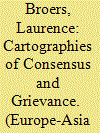| Srl | Item |
| 1 |
ID:
175435


|
|
|
|
|
| Summary/Abstract |
Azerbaijan is a state both confronting protracted minority group secessionism and culturally associated with large co-ethnic minority groups in neighbouring states. This context has generated conflicting pressures on the visualisation of territory in Azerbaijani geopolitical culture. This article surveys contemporary cartographic practices in Azerbaijan and identifies two salient traditions, one reproducing consensus on the territorial integrity of the Azerbaijani state and the other mobilising grievance at truncations of an Azerbaijani ethnic homeland. It identifies the emergence of hybridity between these modes of seeing Azerbaijani territory and discusses their implications for the resolution of the Armenian–Azerbaijani conflict.
|
|
|
|
|
|
|
|
|
|
|
|
|
|
|
|
| 2 |
ID:
175434


|
|
|
|
|
| Summary/Abstract |
Major powers have long used cultural institutes to enhance their appeal in foreign countries. As aspirant powers, Russia and China have recently launched cultural institutes of their own with the aim of improving their international reputations. However, the location and operations of the Confucius Institutes and Russkiy Mir Institutes often seem to run counter to these aims. Drawing on policy diffusion theory (PDT), we argue that these choices are less the product of strategic calculation than of policy emulation and decoupling. Using a mixed methods approach, we show that, while the Confucius Institutes and Russkiy Mir Institutes were modelled after their Western counterparts (emulation), China and Russia have operated their institutes in ways that go against the principles of cultural diplomacy (decoupling). An analysis of field research on these institutes suggests more overall decoupling with Confucius Institutes than with Russkiy Mir Institutes, which might help account for the relatively greater backlash against the Confucius Institutes in their host countries.
|
|
|
|
|
|
|
|
|
|
|
|
|
|
|
|
| 3 |
ID:
175436


|
|
|
|
|
| Summary/Abstract |
This article examines the official police oversight bodies, the ‘public councils’ under the Ministry of Internal Affairs (obshchestvennyi sovet pri MVD), using publicly available data from 40 regional councils. We find that council members are loyal and highly regarded individuals likely to be friendly to state interests. Councils primarily focus on promoting state goals, using the media to perpetuate a positive image of the police, and encouraging traditional values rather than more critical oversight. However, councils also work on non-contentious everyday problems such as improving road safety, preventing crime, and engaging with local youth. This article shows how the Russian state is reconstituting its relationship with society through these state-sanctioned bodies.
|
|
|
|
|
|
|
|
|
|
|
|
|
|
|
|
| 4 |
ID:
175439


|
|
|
|
|
| Summary/Abstract |
This article reconstructs the postwar Anglo–Soviet dispute within the League of Red Cross Societies over unaccompanied children from the Baltic states, whose postwar Soviet citizenship Britain contested. It argues that the resolution of this dispute was prevented by the novel Cold War view, common to both the British and the Soviet governments, that children socialised by ideological enemies were future enemies. With reference to Jane Burbank and Frederick Cooper’s comparative study of empires, it also suggests that, while the proposed repatriation or actual resettlement of the children in former British settler colonies and the United States may have been influenced by Cold War rivalries, the citizenship offered to these children was also determined by the ‘politics of difference’ of the Soviet, British and even the US empires.
|
|
|
|
|
|
|
|
|
|
|
|
|
|
|
|
| 5 |
ID:
175437


|
|
|
|
|
| Summary/Abstract |
This study uses the 2013 Croatian marriage referendum to show how anti-gender activists successfully reframed LGBT rights and emerged as influential political actors. Our examination of newspaper LGBT frames in the period 2002–2013 situates the referendum framing in its broader discursive field. Our analysis shows that anti-gender activists negotiated new resonance for ‘old’ socially conservative issues by appropriating the human rights frame and eroding its credibility, and by seeming to disassociate themselves from morality frames. Our findings contribute to the literature on anti-gender mobilisations in Europe by identifying new framing strategies used by anti-gender actors in their efforts to bring about wider policy and societal changes.
|
|
|
|
|
|
|
|
|
|
|
|
|
|
|
|
| 6 |
ID:
175438


|
|
|
|
|
| Summary/Abstract |
This article offers a discourse analysis of ideas of international brotherhood in Central and Eastern Europe. Taking the example of brotherly ideas centred on the Caucasus in Polish and Serbian media, it examines structures and dynamics of the imagined brotherly connections between these nations. Using the sociology of knowledge approach to discourse (SKAD) and critical geopolitics as a theoretical framework, a three-tier model of circulation of geopolitical imaginations is developed. The analysis interprets the emergence of brotherly ideas as resulting from the elite search for new geopolitical certainties after 1989.
|
|
|
|
|
|
|
|
|
|
|
|
|
|
|
|